This primer provides a comprehensive but non-technical overview of the distinct health information systems (HIS) that all together support health care delivery in low-resource settings. It opens with a historical account and landscape assessment and describes the urgent need to build a lean rigorous HIS that integrates these different components. Subsequent sections describe the individual systems that: i) track individual patient and health care provider information; ii) directly document care delivery; iii) provide public and population health data; iv) support facilities’ and community health workers’ administrative and financial functions; and v) coordinate logistics and health commodities supply chains. A separate section describes imported data, including “master data” and manufactured (e.g., “meta”) data. The primer closes with recommendations for principled HIS stewardship.
WDI trained consultants from the firm PwC on how to teach a WDI-developed women’s leadership program. The Indonesia-based project was organized by the Center for International Private Enterprise and funded by the U.S. State Department. As a result of the program, over a dozen local Indonesian trainers are now equipped to train local female managers — ensuring they’re well positioned to take a leading role in Indonesia’s growing economy.
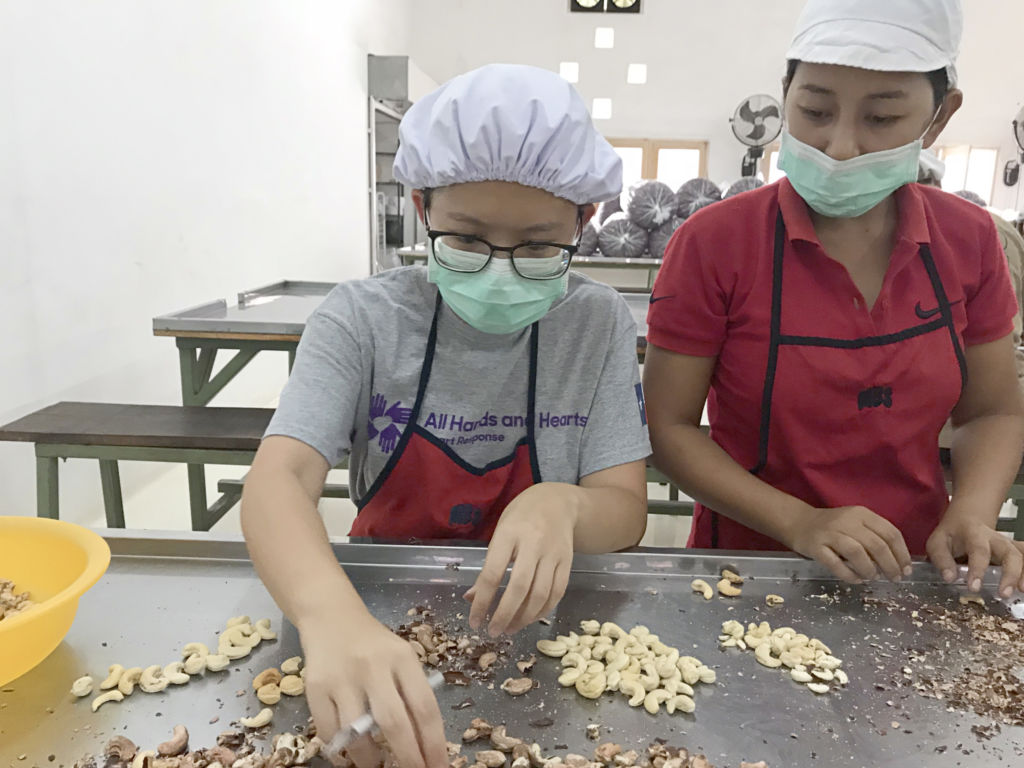
The author, left.
This blog was written by 2018 WDI summer intern Nadia Putri, an MBA candidate at the University of Michigan’s Ross School of Business. It originally appeared on NextBillion.net, an initiative of WDI.
By Nadia Putri
In 2012, Lasmini began working as a daily laborer at East Bali Cashews (EBC) and has worked her way up to be the factory’s kitchen production coordinator. Her path was not without obstacles. Many Balinese women at the base of pyramid, especially in a remote village like Karangasem, have limited access to education and employment opportunities. More than 20 percent of women in Karangasem are illiterate. In addition, of those who are employed in the formal sector, the number of women employees are between 50-75 percent of men. Many women stay unemployed at home or work as informal laborers in agriculture, maintaining a small plot of land or a few animals.
Lasmini was one of the few who completed high school. However, lack of opportunity in the village left her unemployed. Her husband’s income alone was not enough for the family. She helped her mom to make and sell canang sari, daily offerings made by Balinese Hindus to thank God in their prayers. But this did not come close to fulfilling their daily needs. Then the opportunity at EBC came along.
EBC is a vertically-integrated social enterprise specializing in cashew products. It operates a processing facility in remote Desa Ban (Ban Village), Karangasem, one of the poorest regions in Bali, Indonesia. In 2012, Aaron Fishman travelled to Karangasem as a health care volunteer. He was amazed by the beauty of the region, but was struck by the poverty of its cashew farmers. He sought out local partners and started EBC, a social enterprise that combines environmentally sustainable business practices with its mission of community development and women’s empowerment.
EBC capitalizes on the opportunity to process cashews domestically in Bali, rather than the more common practice of shipping the raw product overseas for processing. Each day, EBC processes, on average, about 800 pounds of raw cashews, peeling and preparing them for snack production. (This doesn’t include other finished products, which they also package for snack goods). In addition, EBC emphasizes hiring local talent, especially women, because women’s empowerment and economic development are closely related. The factory currently employs more than 400 people, where 80% of them are women from local Karangasem area. The company’s leadership wants to ensure that what they are building in Desa Ban will lead to the community’s overall prosperity.
As a William Davidson Institute MBA summer intern at EBC’s factory, I had the opportunity to interact with many female employees like Lasmini. Some had successfully ascended to supervisory positions, while others have stayed in the same position since their first day. However, one common thread is that they all have benefited from management’s initiatives in providing them with training opportunities.
For instance, Putu started as a cashew-shelling laborer. She only completed elementary school. However, her limited formal education did not discourage her supervisors from training and promoting her to be the first woman mechanic at the EBC factory. I regularly saw her armed with with a toolbox and steel-toed boots, working on machines in need of repairing.
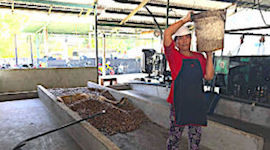
The company also aims to provide equal education opportunity for all levels of employment. For those in the lower level, EBC enrolls employees in NGO-ran weekend classes that prepare them for elementary, middle or high school final examinations, depending on the employee’s needs. For employees who are at staff level or above, EBC offers various in situ training during work hours, ranging from Excel to English.
Providing continuous learning opportunities for employees, in turn, increases their work motivation. As one of the employees told me, “I feel very fortunate to work here and the environment is not like a typical job. Here, it feels like I’m going to college while getting paid at the same time. There’s always something new for me to learn.”
I spent the last two weeks of my internship at EBC providing training and facilitating workshops for supervisors at the factory. Twelve out of 17 training participants were women, some of whom had been recently promoted to supervisor roles, and others who had been supervisors for some time. This shows EBC’s implementation of their women’s empowerment mission: They not only hire women to work as manual laborers, but encourage them to take on leadership roles and further responsibilities.
One example is Wayan, who became coordinator of the peeling area in 2016. Her journey there was not smooth. When her supervisor gauged her interest in becoming a coordinator, she was scared. She had never led people before and felt ashamed of her middle school degree. But, after continuous encouragement, she took on the challenge and has been the area’s coordinator for the past two years.
Wayan’s story shows that leading others often does not come naturally for these employees because they have never had such responsibility before. But EBC keeps pushing the boundaries by providing them with support and setting them up for success once they become a leader. In addition, the company has women in their upper management team, such as General Manager and Head of People Operations, that become role models for the factory employees.
Achieving goals to empower women in a village chock-full of patriarchal tradition is not without hurdles. Though EBC provides opportunities for its employees to grow, at times these opportunities are ignored. In Karangasem, society expects a woman’s first priority should be her family. They fully accept the concept of working mothers. However, this should not come at the expense of their responsibilities at home. After work, many women at EBC will return home and still have to collect hay for their cattle. Some women might turn down promotions or training opportunities due to the additional time commitment. Yet, I’ve heard stories where the household dynamic eventually changed for some of them. Husbands started pitching in to do chores that used to belong solely to women. But such change did not happen overnight. Thus, as EBC work towards fully realizing its goal of equal opportunity for women, its managers need to keep in mind the personal challenges that these employees face everyday. Because once she overcomes these challenges, she can do anything. Lasmini told me once: “I never thought I could get here. But here I am and I can dream again of a better life for my children.”
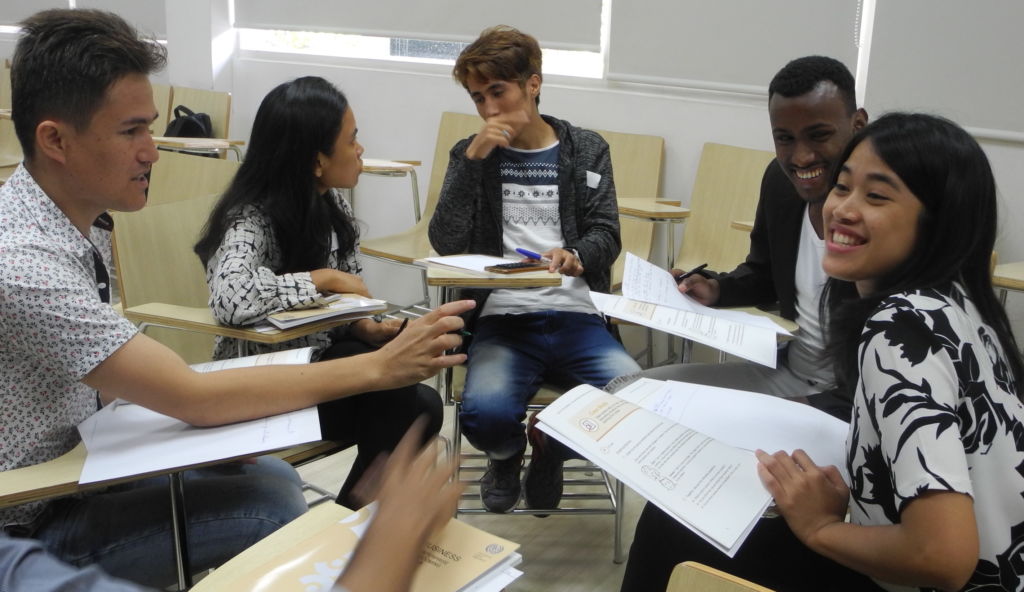
WDI’s Entrepreneurship Development Center (EDC) recently lent support and expertise for a pilot project designed to boost entrepreneurial thinking and problem-solving skills among young refugees and local youth in Jakarta, Indonesia.
EDC team members assisted by reviewing and providing input on 40 training modules to be used to teach entrepreneurship and other skills to young refugees and local youth in the country. The training program, Ready for Business, is organized by the United Nations High Commissioner for Refugees (UNHCR) and the International Labour Organization (ILO).
Over the next six months, approximately 100 youths as young as 16 will meet twice a week for three hours each time to learn how to become more self-reliant. There will be lessons about entrepreneurship, community-supported networking and social development, and strengthening one’s emotional well-being.
The EDC, housed within WDI’s Education Initiative, provides entrepreneurship education consulting to organizations and universities in emerging markets around the globe.
While most of the refugees in the UN program are from Afghanistan, several migrated from Somalia, Eritrea, Ethiopia, Yemen, Iraq, Myanmar and Sudan. The local youth live in Jakarta neighborhoods where the refugee shelters are located.
The Ready for Business training program is divided into five main themes, with emotional well-being and peaceful co-existence activities incorporated into each. The themes are:
At the end of the pilot program, which organizers hope to replicate elsewhere, participants will have developed a business plan for their idea. Aspiring entrepreneurs will be awarded business grants for the best start-up plans, and receive long-term support in the areas of enterprise development, psycho-social well-being, and peaceful co-existence between refugees and the host community.
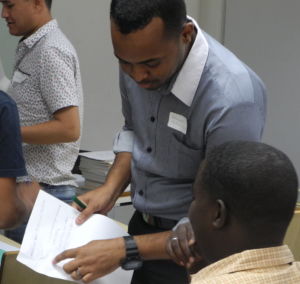
Sara Andersson, enterprise development technical officer at the ILO, said the organization was appreciative of WDI’s help in revising the modules.
“WDI’s suggestions and comments really helped us to take the modules one step further,” she said.
Amy Gillett, vice president of WDI’s Education Initiative, said WDI was pleased to work with the ILO on the entrepreneurship curriculum.
“The curriculum is very solid and incorporates many best practices in entrepreneurship education, including mini-case studies of entreprepreneurs operating locally and many hands-on activities,” Gillett said. “I am sure the graduates of Ready for Business will be well positioned to launch a sustainable business.”
The pilot training program in Jakarta was launched in early September. Andersson said the program is off to a great start and students seem motivated and excited to participate.
“There was a lot of interaction between local and refugee youth, and the materials seem to be just the right level for the students,” she said. “It was great to see how easily students adjusted to the methodology and started working independently without support in their groups. There was a lot of discussion and many students expressed afterwards that they really enjoyed the initial focus on their own dreams and visions.”
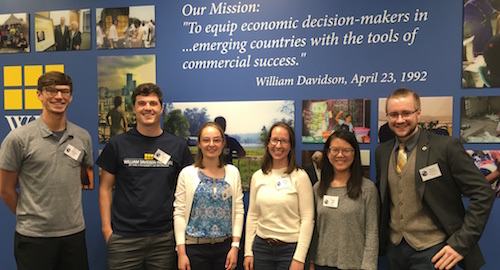
WDI’s 2018 summer interns before they set off on their voyages.
Over the years, WDI’s summer interns have faced unique challenges as they have conducted their work across the globe for the Institute and its partners. Impassable roads, extreme weather, the occasional wild animal. An active volcano can now be added to the list.
WDI intern Nadia Putri spent her summer in Bali, Indonesia working with East Bali Cashews on quality improvement projects, measuring the company’s impact on women and developing a U.S. market entry strategy. She also got an up close look at emergency preparedness.
“It was really beautiful, but a bit scary at the same time for someone who has never seen anything like it before,” she wrote of watching the sparks of lava and plume of smoke rise from the crater near where she was working. The cashew factory was outside the evacuation zone but management kept a daily eye on the volcano in case conditions changed. Earthquakes in the region have claimed nearly 400 lives during August.
Putri was one of six WDI interns working internationally this summer. Some, like Putri, have returned to the University of Michigan campus; others are finishing up their work and will be back in Ann Arbor soon. While overseas, the interns contributed to a blog to chronicle not only their work but also the experience of living in a foreign land. WDI has highlighted some of the work below and the full blog chronicling interns’ experiences is available here.
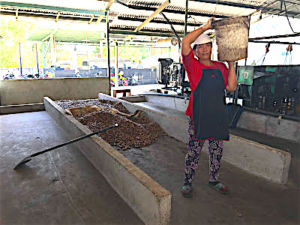
East Bali Cashews where Putri worked sources sustainably grown cashews from nearby smallholder farmers and processes them in a factory located in a remote village in one of Bali’s poorest regions. Since its launch in 2012, the company has integrated various social missions in and around its cashew processing operations, including community improvement and women’s empowerment.
Putri, a Ross School of Business MBA candidate, said factory workers were very supportive of her work and willing to explain how the company has impacted them. One employee recalled being hired after graduating from high school and is now in charge of 50 workers.
“At the factory, everyone is very welcoming and open to share their stories,” Putri wrote in her blog. “It’s especially humbling to see such high curiosity and willingness to learn from the factory employees. This serves as my daily reminder that (the) situation you grew up or lived in does not define who you could be.”
In Kenya, Andrea Arathoon, a School of Public Health graduate student, was tasked with helping a local maternity hospital reduce costs and increase patient volumes to achieve sustainability while also maintaining quality. One intervention Arathoon worked on for Jacaranda Maternity is a new outpatient care checklist for prenatal visits.
 The checklist is designed to improve patient processing within the outpatient clinic. This improved flow will reduce wait times and result in more efficient consultations, thus increasing patient volume and reducing costs, Arathoon wrote. She ensured the checklist followed the World Health Organization and Kenya Ministry of Health guidelines. The hospital’s doctors, nurses and administrative staff were consulted, and everyone was trained on how to properly use the new tool.
The checklist is designed to improve patient processing within the outpatient clinic. This improved flow will reduce wait times and result in more efficient consultations, thus increasing patient volume and reducing costs, Arathoon wrote. She ensured the checklist followed the World Health Organization and Kenya Ministry of Health guidelines. The hospital’s doctors, nurses and administrative staff were consulted, and everyone was trained on how to properly use the new tool.
“I am very excited about my summer project and the impact that it can have in improving maternity care for women and children in the country,” Arathoon wrote on the blog.
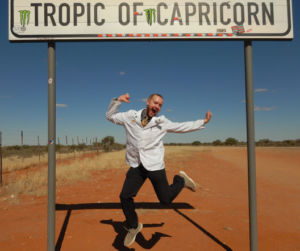
Across Africa on the Atlantic coast, Mason Benjamin is working in Namibia on pharmacy workforce development and hospital pharmacy practice. Benjamin, a College of Pharmacy graduate student, joined a collaborative project between WDI and the International Pharmaceutical Federation Hospital Pharmacy Section. The goal of the project, which includes the University of Namibia School of Pharmacy, is to increase the capacity of hospital pharmacists in Namibia through in-country diagnostics and technical assistance.
Benjamin has been traveling all across the country to visit hospital pharmacies in different regions to develop a landscape analysis of hospital pharmacy practices at both private and public hospitals. Before his site visits began, Benjamin attended the Medication Utilization Review In Africa (MURIA) conference, where he learned about pharmacy practice not only in Namibia but also across Africa.
“I was aware of how different the healthcare system in the United States might be from anywhere else in the world, but always felt that researching other systems online had its limits,” Benjamin wrote in the blog. “I much prefer to learn right from the source and in person, so I was grateful for the opportunity to ask questions to practicing pharmacists from over a dozen different African countries about how things worked in their setting.”
In India, the population of cities is expected to increase by 250 million people in the next 20 years, making employment a crucial need for the new transplants. Ross School of Business MBA student Chris Owen is working with MADE (Michigan Academy for the Development of Entrepreneurs) and its Madurai-based partner Poornatha, which is designing an affordable, world-class coaching curriculum for entrepreneurs in emerging economies. MADE was founded by WDI and U-M’s Zell Lurie Institute.
Owen is identifying best practices of existing coaching programs in India and other emerging economies, conducting a needs assessment of entrepreneurs in Madurai and developing a framework and training curriculum for how coaches will be identified, on-boarded and trained.
“By investing in strong local economies, India can address its dual-challenges of rapid urbanization and rising unemployment,” Owen wrote on the intern blog. “Indeed, for this reason, entrepreneurship in India – and the work of Poornatha – is becoming increasingly important.”
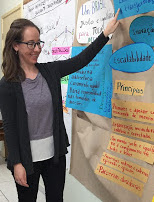 In Brazil, Rebecca Grossman-Kahn – a student at Ross and the U-M Medical School – is developing a tool to assess the social impact of the gender equality programs of Plan International’s Brazil office. Plan International has a long history of advocating for children’s rights but recently decided to focus its work in Brazil on promoting girls’ rights and equality. Gender roles in Brazil tend to be rigid and many girls stop studying in middle or high school to help with housework at home, Grossman-Kahn wrote on the blog. She attended a staff retreat to strategize on how to combat resistance from community members and organizations regarding Plan’s new focus on gender.
In Brazil, Rebecca Grossman-Kahn – a student at Ross and the U-M Medical School – is developing a tool to assess the social impact of the gender equality programs of Plan International’s Brazil office. Plan International has a long history of advocating for children’s rights but recently decided to focus its work in Brazil on promoting girls’ rights and equality. Gender roles in Brazil tend to be rigid and many girls stop studying in middle or high school to help with housework at home, Grossman-Kahn wrote on the blog. She attended a staff retreat to strategize on how to combat resistance from community members and organizations regarding Plan’s new focus on gender.
While at the retreat, a new World Bank report was released that showed girls who complete secondary education can expect to earn twice as much as those with no education.
“Studies like this can help get community leaders on board with Plan’s mission,” Grossman-Kahn wrote.
In Nepal, nearly two out of three working people are farmers. But the country’s rugged topography and lack of infrastructure makes it difficult to farm year-round despite a lengthy monsoon season. Additionally, in rural Nepal, only 5 percent of the population has reliable access to electricity. But the country has more than 300 days of sunshine, making it a perfect candidate for solar-powered agricultural services.
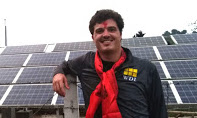 Matthew Carney, a dual degree student at Ross and the U-M School for Environment and Sustainability, spent the summer with the solar startup Ecoprise to help bring solar-powered agricultural services to subsistence farmers in the Terai region of Nepal that borders India. AgroHub, a pay-as-you-go service-based business model recently started by Ecoprise, provides access to solar-powered infrastructure for remote, underserved farming communities. These hubs provide farmers with access to equipment for irrigation, clean drinking water, food-processing and refrigerated post-harvest storage as a service.
Matthew Carney, a dual degree student at Ross and the U-M School for Environment and Sustainability, spent the summer with the solar startup Ecoprise to help bring solar-powered agricultural services to subsistence farmers in the Terai region of Nepal that borders India. AgroHub, a pay-as-you-go service-based business model recently started by Ecoprise, provides access to solar-powered infrastructure for remote, underserved farming communities. These hubs provide farmers with access to equipment for irrigation, clean drinking water, food-processing and refrigerated post-harvest storage as a service.
AgroHub has proved very successful for those farmers who have used it, allowing them to irrigate more land during the winter and monsoon seasons and reducing the use of diesel-powered water pumps that saves money. Carney’s task is to develop a plan to bring the service to farmers in western Nepal.
“Solar-powered agriculture presents an opportunity to raise the living standards of millions of rural Nepali farmers in a sustainable fashion,” he wrote. “It would be a shame to waste it.”
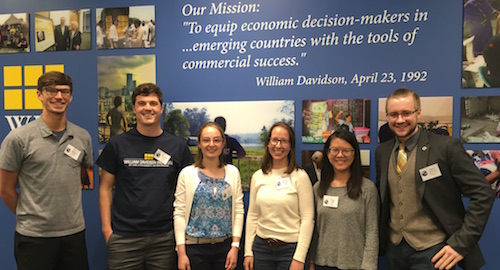
Six U-M graduate students are participating in the 2018 WDI Global Impact Internship program.
When Rebecca Grossman-Kahn was in high school, she was a volunteer with Amigos de las Américas, a youth leadership and cultural exchange program that partners with Plan International, a global development and humanitarian organization. While an undergrad at Stanford University, she worked in Honduras and Nicaragua for the organization.
“I just loved it,” she said. “I loved living in a different place, I loved speaking Spanish.”
So when the Ross School of Business MBA candidate and University of Michigan Medical School student was looking to create her own summer internship, she reached out to several organizations. The first to respond was Plan International, which works to empower children – especially girls.
“They were interested in revamping their evaluation program and I knew WDI worked in performance measurement,” Grossman-Kahn said.
She pitched the partnership to WDI as a student-initiated internship and it was approved. In mid-June, she will head to Brazil to develop a survey tool Plan International will use to assess the impact of their programs. In addition to student-initiated internships, WDI also develops student summer opportunities along with its partners.
Grossman-Kahn is one of six U-M graduate students participating in the 2018 WDI Global Impact Internship program. The students represent the Ross School of Business, the School of Public Health, the College of Pharmacy, the School for Environment and Sustainability (SEAS) and the Medical School. They will work in Brazil, India, Indonesia, Kenya, Namibia and Nepal, and support the work of WDI initiatives in Education and its Entrepreneurship Development Center, Energy, Healthcare, Performance Measurement and Scaling Impact. All of the interns have met with their respective WDI initiative leaders and will continue to keep in touch once in the field.
Colm Fay, who leads WDI’s Energy Initiative, said he is interested in understanding more about access to energy for productive use because of the impact it can have in low- and middle-income countries. Fay will be working with graduate student Matthew Carney, who will be interning at Ecoprise, which designs, builds and installs clean energy products in Nepal for energy-poor communities.
“Matt’s work with Ecoprise will provide important learnings about how an innovative business model to provide energy for agricultural loads can impact rural livelihoods, and how the well-being of these communities can be enhanced through greater access to energy,” Fay said.
Fay also directs WDI’s Scaling Impact initiative and is working on a project in Kenya with intern Andrea Arathoon. He said Scaling Impact wants to develop tools and frameworks that help enterprises achieve sustainability at scale.
“Andrea’s experience with Jacaranda, an organization that is seeking both to scale its operations as well as replicate its approach through partners, will further our understanding of the strategies and resources that are necessary to design business models for scale,” Fay said. “Her work will also provide great insights on how enterprises measure performance in terms of both sustainability and impact, and how best to frame this for investors.”
For Grossman-Kahn, her summer in Brazil will not be her first trip to the country. She lived there while participating in a study abroad program as an undergrad and learned Portuguese. She is looking forward to going back and collaborating with a familiar partner.
Grossman-Kahn said she will split her time between doing high-level strategy work in an office in Sao Paulo and observing Plan International’s programs in rural towns.
“I’m really excited about working with Plan International again,” she said. “They are really mission driven. Everyone in the organization is passionate about the work they’re doing.”
Here are the all WDI interns and their projects:
Andrea Arathoon
School of Public Health
Jacaranda Health
Nairobi, Kenya
WDI Partner: Scaling Impact initiative
Jacaranda Health operates a maternity hospital where it sees more than 2,000 clients a month and wants to create East Africa’s first truly sustainable and scalable maternal health service delivery organization. It is partnering with 15 government hospitals to refine a model for improving quality of maternal healthcare in the public sector.
Andrea will develop the latest version of Jacaranda’s business model and debt/equity financing structure for its next round of investment. She also will assess market and business model opportunities for expansion, improve profitability in the hospital by evaluating new service lines, marketing and customer insights.
Mason Benjamin
School of Pharmacy
WDI & International Pharmaceutical Federation (FIP) Hospital Pharmacy Section (HPS)
Namibia
WDI Partner: Healthcare initiative
FIP is a global federation representing 3 million pharmacists and pharmaceutical scientists worldwide. The Hospital Pharmacy Section’s objectives are to further hospital pharmacy in all its aspects, including the needs of developing countries. FIP, in partnership with WDI, is establishing a collaboration with the University of Namibia School of Pharmacy to increase the capacity of hospital pharmacists in two pilot countries, Namibia and Pakistan, through in-country diagnostics and technical assistance. The summer intern will provide preliminary research on Namibia, which will then inform next steps and content design for this collaboration in pharmacy workforce development.
Mason will develop a landscape analysis of hospital pharmacy practices in Namibia, both at private and public hospitals, in support of a larger pharmacy workforce development goal.
Nadia Putri
Ross School of Business
East Bali Cashews
Bali, Indonesia
WDI Partner: Entrepreneurship Development Center (Education Initiative)
Founded in 2012, East Bali Cashews (EBC) sources sustainably grown cashews from nearby smallholder farmers and processes them in a factory located in a remote village in one of Bali’s poorest regions. Since its launch, the company has integrated various social missions in and around their cashew processing operations, including community improvement and women’s empowerment.
For her internship, Nadia will design a U.S. market entry strategy and actionable roadmap, develop sustainable quality and efficiency improvements and create a food production “best practices” guide. Additionally, in partnership with WDI’s Entrepreneurship Development Center, Nadia will develop a strategy to support EBC’s mission for women empowerment and develop a mini case study how they would achieve it.
Chris Owen
Ross School of Business and School for Environment and Sustainability
Michigan Academy for the Development of Entrepreneurs (MADE)
India
WDI Partner: WDI President Paul Clyde
The Michigan Academy for the Development of Entrepreneurs (MADE) is a U.S.-based nonprofit organization whose aim is to develop entrepreneurs in emerging economies. MADE was founded by the William Davidson and Zell-Lurie Institutes at the University of Michigan and Aparajitha Foundation in Madurai, India. MADE provides Entrepreneurship Development Organizations (EDOs) in emerging economies a repeatable, scalable, transferable and profitable service platform to develop entrepreneurs in their home countries.
For his project, Chris will Identify best practices of existing coaching programs in India and other emerging economies, conduct a needs assessment of entrepreneurs in Madurai and develop a framework and training curriculum for how coaches will be identified, on-boarded and trained. Chris’ work continues a succession of Ross School student teams who have worked with MADE since its launch in late 2017.
Rebecca Grossman-Kahn
Ross School of Business and University of Michigan Medical School
Plan International
Brazil
WDI Partner: Performance Measurement initiative
Plan International is a not-for-profit, non-governmental organization founded in 1937. It is a development and humanitarian organization that advances children’s rights and equality for girls through various programs.
For her internship, Rebecca will develop a tool to assess the social impact of Plan Brazil’s gender equality programs; develop a framework for evaluating impact of violence prevention and girls’ empowerment programs that can be adapted to other partner organizations and in other settings. In addition, Rebecca will also analyze Plan International’s program cost structure and provide recommendations for standardizing and cost savings.
Matthew Carney
Ross School of Business and School for Environment and Sustainability
Ecoprise
Nepal
WDI Partner: Energy initiative
Founded six years ago, Ecoprise designs, builds and installs clean energy products in Nepal for the underserved, energy-poor communities in order to create positive economic, environmental and social impact. Ecoprise recently started AgroHub, a pay-as-you-go service-based business model that aims to provide access to solar-powered infrastructure for remote underserved farming communities. These hubs provide farmers with access to equipment for irrigation, clean drinking water, food-processing and refrigerated post-harvest storage as a service, with ownership of equipment remaining with AgroHub or Ecoprise.
Matthew will develop a theory of change report and a business plan for Ecoprise’s AgroHub model in western Nepal.
A leader in healthcare for over 80 years, Baxter manufactures and markets products that save and sustain the lives of people with hemophilia, immune disorders, infectious diseases, kidney disease, trauma, and other chronic and acute medical conditions. As a global, diversified healthcare company, Baxter applies a unique combination of expertise in medical devices, pharmaceuticals and biotechnology to create products that advance patient care worldwide. Student intern Jenny Simonson was part of Baxter’s business model innovations group and developed an expansion strategy for the emerging markets of India and Indonesia.
Global Entrepreneurship Program Indonesia (GEPI) aims to catalyze Indonesia’s entrepreneurship strategies by working in partnership with existing programs and linking aspiring Indonesian entrepreneurs to global developments and investment prospects. To address the issues facing social enterprises in Indonesia, GEPI in partnership with LGT Venture Philanthropy, launched for the second consecutive year, the Smiling World Accelerator Program (SWAP) to actively support and invest in Indonesian social enterprises leveraging venture capital principles and impact investing methodologies. SWAP 2013 sourced and invested in multiple social enterprises up to $50K each. Student intern Nancy Gephart conducted due diligence on several shortlisted portfolio companies.
Since 1979, Mercy Corps has helped people survive tough hardships and then thrive through long term economic development solutions. Mercy Corps’ approach is to help communities turn crisis into opportunity by demonstrating innovation, timeliness, and the ability to adapt quickly to changing realities. Mercy Corps has helped build the first sustainable and hygienic Indonesian tempeh factory that produces clean and tasty tempeh using the highest quality equipment, soybeans and production standards. Student intern Annie Cronin worked to identify market demand for higher quality tempeh, a food traditionally produced in Indonesia from fermented soybeans.
Vittana is a Seattle-based nonprofit that facilitates microloans to students in developing countries. Vittana aims to help students worldwide attend post-secondary schools. Donors offer to pay for students’ tuition by lending them small amounts — typically $25-50. Student repayment rate is 99 percent. In Indonesia, Vittana is partnered with the Putera Sampoerna Foundation and has launched its first student loan program targeted at final year university students. Student intern Yuchen Lu built partnerships with the universities and reached out to prospective students.